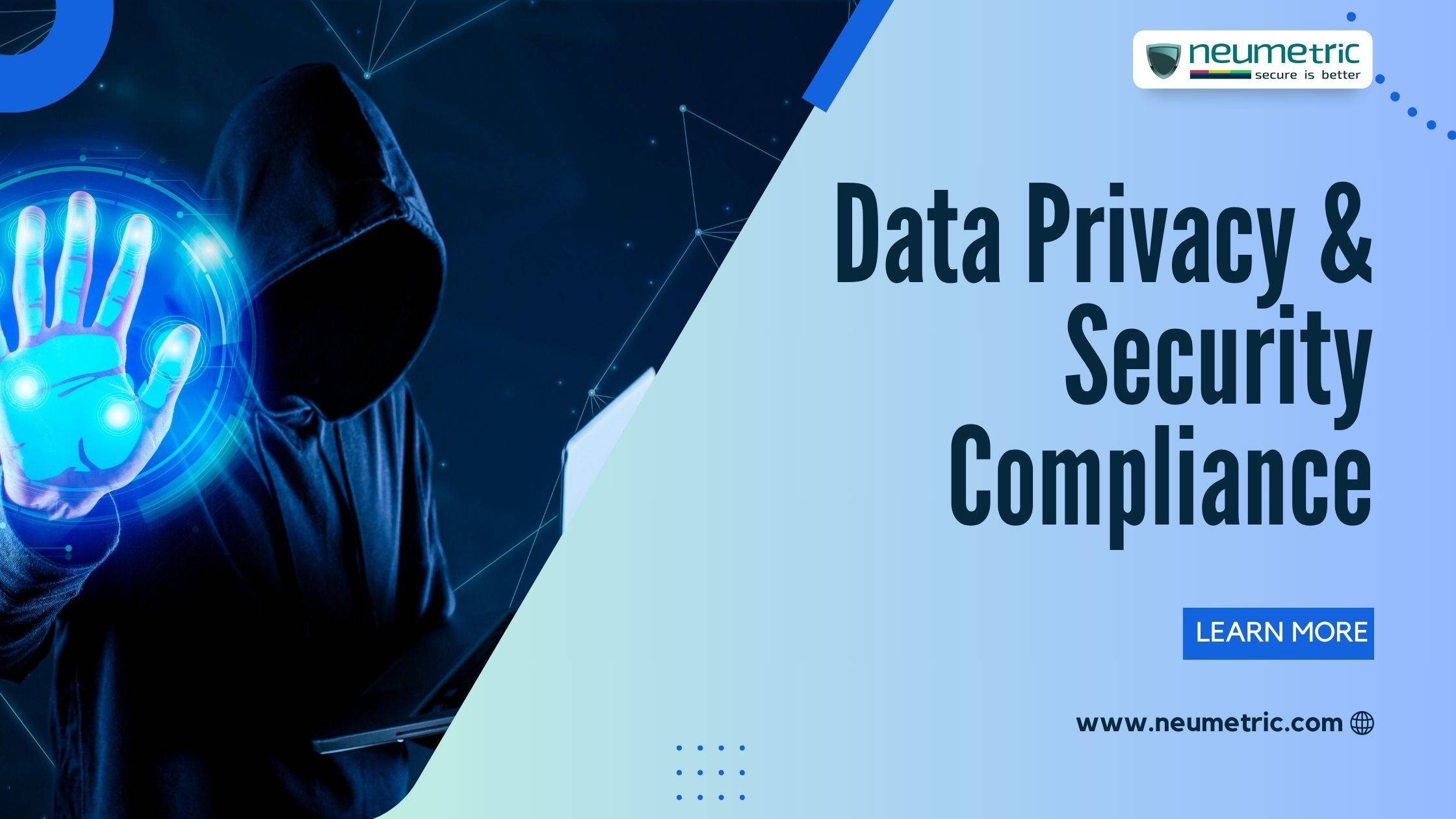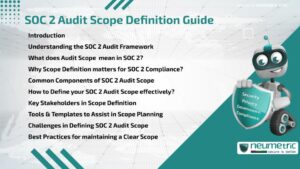Table of Contents
ToggleIntroduction
In our modern, digitally-driven world, the use of data is integral to businesses across diverse sectors. However, with this reliance comes the responsibility of safeguarding data privacy & security. As organisations increasingly rely on the collection, storage & processing of vast amounts of data, the need to safeguard sensitive information has never been more critical.
Data privacy & security compliance refer to the adherence of organisations to established rules, regulations & best practices aimed at safeguarding sensitive information. This includes protecting personal data from unauthorised access, ensuring its confidentiality & implementing measures to prevent data breaches.
The first pillar of data privacy & security compliance revolves around understanding the ever-evolving regulatory landscape. From the European Union’s General Data Protection Regulation [GDPR] to the California Consumer Privacy Act [CCPA], organisations must navigate a complex web of rules to safeguard user information. Each regulation brings forth distinct requirements, with GDPR emphasising the rights of European citizens, HIPAA safeguarding health-related data & CCPA focusing on consumer privacy in California.
Importance
Ensuring data privacy & security compliance is crucial for several reasons:
Legal obligation: Many jurisdictions have stringent data protection laws that require organisations to safeguard user information. Compliance ensures that businesses adhere to these laws, avoiding legal consequences such as fines & penalties.
Trust & reputation: Consumers trust organisations that prioritise the privacy & security of their data. Compliance builds a positive reputation, fostering trust among customers, partners & stakeholders.
Risk mitigation: Non-compliance poses significant risks, including data breaches & their associated financial, legal & reputational consequences. Compliance measures mitigate these risks, protecting organisations from potential harm.
Global operations: Businesses often operate in an interconnected world across borders. Compliance with various international regulations ensures a seamless & lawful global presence, preventing regulatory conflicts & legal challenges.
Competitive advantage: Demonstrating a commitment to data privacy & security can be a competitive advantage. It sets organisations apart in the eyes of consumers who prioritise their data’s protection & may choose businesses that prioritise privacy.
Ethical responsibility: Organisations have an ethical responsibility to protect the personal information entrusted to them. Data privacy & security compliance reflect an ethical commitment to respecting individuals’ rights & privacy.
Regulatory frameworks
The regulatory frameworks of data privacy & security compliance are a complex tapestry of laws & regulations designed to safeguard individuals’ personal information & ensure the secure handling of data by organisations. Several key regulatory frameworks have been established globally to address these concerns:
General Data Protection Regulation [GDPR]:
Jurisdiction: European Union [EU] & European Economic Area [EEA]
Focus: Empowers EU citizens with greater control over their personal data, requiring organisations to obtain explicit consent, disclose data usage purposes & implement stringent data protection measures.
Health Insurance Portability & Accountability Act [HIPAA]:
Jurisdiction: The United States
Focus: Primarily applies to healthcare organisations, setting standards for the protection of patients’ medical records & Personal Health Information [PHI].
California Consumer Privacy Act [CCPA]:
Jurisdiction: California, The United States
Focus: Grants California residents the right to know what personal information is collected, request its deletion & opt-out of its sale, emphasising transparency & control over personal data.
Personal Information Protection & Electronic Documents Act [PIPEDA]:
Jurisdiction: Canada
Focus: Governs the collection, use & disclosure of personal information by private sector organisations, promoting transparency & consent.
Privacy Shield:
Jurisdiction: Facilitated data transfers between the EU & The United States
Focus: Provided a framework for companies to comply with EU data protection requirements when transferring personal data from the EU to the United States.
Cybersecurity Law of the People’s Republic of China:
Jurisdiction: China
Focus: Regulates data processing within China, emphasising data localization & imposing cybersecurity obligations on network operators.
Personal Data Protection Bill [PDPB]:
Jurisdiction: India
Focus: A proposed law addressing the processing & protection of personal data in India, incorporating principles aligned with global data protection standards.
Data Protection Act 2018:
Jurisdiction: United Kingdom
Focus: Adapts GDPR standards post-Brexit, governing the processing of personal data in the UK.
Navigating these diverse regulatory frameworks is essential for organisations to ensure compliance, protect individuals’ privacy rights & avoid legal consequences associated with data breaches & mishandling of personal information. Organisations with a global footprint often need to develop comprehensive strategies that consider the nuances of each jurisdiction in which they operate.
Best practices for robust data privacy
Organisational responsibilities: Once familiar with the regulations, organisations must internalise their responsibilities in protecting data. This involves implementing robust policies, appointing data protection officers & conducting regular privacy impact assessments. Addressing these internal facets ensures a proactive approach to data privacy & security, aligning with regulatory requirements & mitigating risks associated with data breaches.
Data governance & protection: Beyond compliance, effective data governance is essential for long-term data protection. This section will delve into the importance of data classification, encryption & access controls. It explores the implementation of technologies & strategies to monitor & safeguard data throughout its lifecycle, ensuring that only authorised individuals can access & manipulate sensitive information.
Employee training & awareness: An organisation’s human element is often its weakest link in the data privacy & security chain. Comprehensive training programs are crucial to instil a culture of awareness among employees. This segment will explore the significance of ongoing education, simulated phishing exercises & regular communication to create a vigilant workforce that actively contributes to data protection efforts.
Incident response & breach management: Despite preventive measures, data breaches can still occur. This section outlines the importance of having a robust incident response plan, detailing the steps organisations should take when a breach is detected. From containment to notification procedures, understanding how to effectively manage a breach is critical in minimising damage & complying with regulatory requirements for reporting.
Information management
Data minimization: Data minimization involves the strategic approach of collecting & processing only the minimum amount of personal data necessary for a specific purpose. This practice reduces privacy risks, enhances data protection & ensures that organisations handle only the information essential to their operations, promoting efficiency & compliance with privacy regulations.
Reducing data collection & storage: Actively reducing data collection & storage emphasises the importance of minimising the volume of data an organisation gathers & retains. This approach aligns with the principle of data minimization, contributing to streamlined data management processes, reduced security risks & optimised resource utilisation.
Consent management: Consent management is a systematic process that revolves around obtaining, recording & managing user consent for the collection & processing of their personal data. It ensures that individuals are informed about data practices, empowering them to make informed decisions about how their information is handled, fostering transparency & compliance.
Obtaining & managing user consent: The process of obtaining & managing user consent involves actively seeking permission from individuals before collecting & processing their personal data. Effective management includes maintaining clear records of consent, allowing users to modify or withdraw their consent & ensuring ongoing compliance with evolving data protection regulations.
Vendor management: Vendor management is a critical aspect of data privacy, involving the oversight & control of third-party vendors or service providers that have access to or process data on behalf of an organisation. This practice ensures that vendors comply with data protection standards, reducing the risk of data breaches & maintaining overall data integrity.
Ensuring third-party compliance: Ensuring third-party compliance is the verification process that external entities, such as vendors or partners, adhere to the same data protection & privacy standards as the organisation. This involves contractual agreements, audits & ongoing monitoring to mitigate risks associated with third-party data processing & maintain a secure data environment.
Compliance challenges
Regulatory complexity: Keeping pace with a multitude of data privacy laws like GDPR, CCPA & others worldwide poses a significant challenge. Understanding the nuances of each regulation & aligning operational practices accordingly is daunting.
Data proliferation: With the exponential growth of data, organisations struggle to track & manage the vast volumes of information they collect. This proliferation increases the risk of data breaches & complicates efforts to maintain compliance.
Technological advancements: Rapid advancements in technology introduce new tools & platforms, making it challenging to ensure that these innovations align with existing privacy frameworks. Adopting new technologies while maintaining compliance is a balancing act.
Cross-border data transfers: Global businesses face complexities when transferring data across international borders. Ensuring compliance while maintaining the free flow of information between countries with differing regulations is a significant challenge.
Resource constraints: Small & medium-sized enterprises, in particular, often struggle due to limited resources both financial & human to implement robust data privacy measures & keep up with compliance requirements. To address these challenges, organisations need a comprehensive approach that includes ongoing education, strategic planning, robust technological solutions & a commitment to a culture of privacy. Regular assessments & audits, coupled with proactive measures, are crucial in overcoming compliance challenges & ensuring data privacy & security in today’s digital landscape.
Implementing privacy measures
Data mapping & inventory: This involves the systematic process of identifying, documenting & cataloguing all data assets within an organisation. It provides a comprehensive view of where data is stored, how it moves through the organisation & who has access to it. Data mapping & inventory help organisations understand the scope & complexity of their data landscape, aiding in compliance efforts, risk assessment & efficient data management.
Identifying data assets: This refers to the process of recognizing & acknowledging the various types of data that an organisation collects, processes & stores. Data assets can include customer information, financial records, intellectual property & more. Identifying data assets is crucial for prioritising data protection efforts. It helps organisations recognize the sensitivity & value of different types of data, allowing them to tailor security measures accordingly.
Classifying & managing data: Data classification involves categorising data based on its sensitivity or importance. This process enables organisations to apply appropriate security controls & management practices to different types of data. Classifying & managing data ensures that resources are allocated based on the importance & risk associated with different data types. It facilitates more targeted protection efforts & supports compliance with regulatory requirements.
Privacy by design & default: Privacy by Design is an approach where data protection & privacy considerations are integrated into the design & development of systems, processes & products from the outset. Privacy by Default ensures that the strictest privacy settings are the default settings. Incorporating privacy into the design process ensures that privacy features are not retrofitted but are inherent, enhancing user trust & minimising the risk of privacy breaches.
Integrating privacy from the start: This involves embedding privacy considerations into the entire lifecycle of a project, product or service. It starts from the initial planning & design stages & continues through development, deployment & ongoing operations. Integrating privacy from the start helps organisations proactively address privacy concerns, reducing the likelihood of non-compliance & minimising the need for costly adjustments later in the development process.
Ensuring data security in product development: This refers to incorporating robust security measures throughout the product development lifecycle. It includes implementing encryption, access controls & other security mechanisms to protect data from unauthorised access or breaches. Ensuring data security in product development is essential to mitigate the risk of data breaches. By integrating security measures into the development process, organisations can create products that are resilient to cyber threats & adhere to data protection standards.
Conclusion
In conclusion, the journey toward data privacy & security compliance is ongoing. By embracing best practices, organisations position themselves not only to meet current regulatory demands but also to adapt to future changes in the digital landscape. As technology continues to evolve, a proactive & comprehensive approach to data protection is not just a legal necessity but a strategic advantage that enhances trust, safeguards reputation & fortifies the foundations of responsible data management.
Moreover, the emphasis on employee training & awareness, coupled with a robust incident response & breach management plan, underscores the importance of a holistic strategy that involves both technological measures & human vigilance. By embracing these best practices, organisations can not only meet regulatory standards but also instil a culture that prioritises data privacy & security, thus safeguarding their reputation, building trust with stakeholders & ultimately contributing to a more secure digital landscape.
FAQ’s
What role does technology play in achieving data privacy & security compliance?
Technology is integral to compliance efforts. Encryption tools, data loss prevention systems & identity management solutions can enhance security. Automated monitoring & auditing tools aid in ensuring ongoing compliance.
How can organisations ensure global compliance with varying regulations?
Organisations can ensure global compliance by conducting thorough assessments of applicable regulations, implementing scalable & adaptable policies & leveraging technology solutions that facilitate compliance across different jurisdictions.
How should organisations approach incident response & breach management?
Organisations should have a well-defined incident response plan in place, detailing steps for detection, containment, eradication, recovery & communication.
What is the importance of data privacy & security compliance for businesses?
Data privacy & security compliance are critical for businesses to protect sensitive information, maintain customer trust & adhere to legal requirements.





